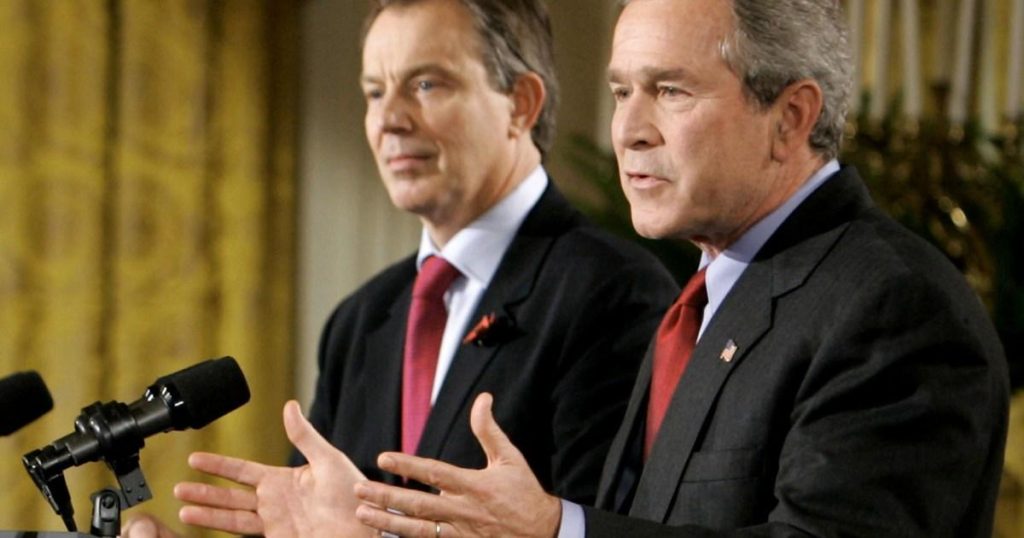The Iraq War, launched in 2003, quickly devolved into a quagmire of escalating violence and political instability, forcing the Bush administration to confront the stark realities of a conflict far more complex than initially anticipated. Richard Armitage, then-Deputy Secretary of State, confided in Sir David Manning, the British ambassador, expressing his deep concern over President Bush’s perceived divinely ordained mission in Iraq. Armitage believed that the President’s conviction needed to be tempered with a “dose of reality,” and he urged Blair to leverage his close relationship with Bush to steer the administration towards a more pragmatic, politically driven approach to restoring order in the war-torn nation. This plea underscored the growing apprehension within the US administration about the escalating insurgency and the President’s seemingly unwavering belief in the righteousness of the intervention.
The situation in Fallujah, a city west of Baghdad, served as a microcosm of the broader challenges facing the coalition forces. Following the invasion, Fallujah became a hotbed of insurgent activity. When a US commander confidently asserted that he could quell the uprising within days, Armitage dismissed the claim as “bullshit,” reflecting a growing skepticism within the administration about the military’s optimistic assessments. The subsequent offensive in Fallujah, Operation Vigilant Resolve, launched in April 2004, proved to be a disastrous turning point in the war. The heavy-handed tactics employed by US forces, resulting in significant civilian casualties, further inflamed the insurgency and alienated segments of the Iraqi population. This debacle, occurring less than a year after Bush’s premature “mission accomplished” declaration, exposed the administration’s miscalculations about the nature of the conflict and the resilience of the Iraqi resistance.
Armitage’s candid conversation with Sir David revealed the internal tensions and anxieties within the Bush administration. He admitted that Bush’s initial reaction to the escalating violence in Fallujah was a desire to “kick ass,” a sentiment indicative of the President’s frustration and determination to assert control. However, this aggressive stance was met with resistance from within the administration, including warnings that such a heavy-handed approach could fracture the fragile coalition and exacerbate the instability. Faced with these warnings, Bush reluctantly backed off, demonstrating a degree of pragmatism, although Armitage’s observation about Bush still believing in a divine mission suggested that the President’s fundamental worldview remained unchanged.
The escalating violence and deteriorating security situation in Iraq presented a formidable challenge for the Bush administration. Armitage acknowledged the inevitability of deploying additional troops to regain control, a politically unpopular move given the growing anti-war sentiment both domestically and internationally. This dilemma underscored the precarious position of the administration, caught between the need to stabilize Iraq and the political ramifications of escalating the military commitment. The situation in Fallujah had become a symbol of the broader war, highlighting the difficulties in balancing military force with the need for a political solution. Armitage’s emphasis on the importance of the UN and its envoy, Lakhdar Brahimi, reflected a growing recognition within the administration that a purely military approach was insufficient and that a political process was essential for achieving long-term stability in Iraq.
The April 2004 offensive in Fallujah ultimately ended in a stalemate, with heavy casualties on all sides. The significant loss of American lives, coupled with the substantial number of insurgent and civilian deaths, forced a reevaluation of the strategy. The offensive was called off just two weeks after its launch, highlighting the complex and volatile nature of the conflict. The capture of Fallujah several months later, in November 2004, while a tactical victory, did little to address the underlying issues fueling the insurgency. The ongoing violence and instability underscored the challenges in achieving a lasting peace in Iraq, a reality that the Bush administration continued to grapple with throughout its remaining tenure.
The Iraq War, initially envisioned as a swift and decisive operation, became a protracted and costly conflict with far-reaching consequences. The newly released UK government files offer a glimpse into the internal deliberations and anxieties within the Bush administration as it struggled to navigate the complexities of the war. Armitage’s candid assessment of the situation, including his concerns about Bush’s perceived divine mission and the need for a political solution, reflects the growing realization that a purely military approach was insufficient to achieve lasting stability in Iraq. The events in Fallujah, in particular, served as a stark reminder of the challenges and the human cost of the conflict, underscoring the need for a comprehensive and politically driven approach to resolving the crisis. The war continued for several years after Bush left office, with US troops finally withdrawing in 2011, leaving behind a legacy of instability and violence that continues to shape the region today.











